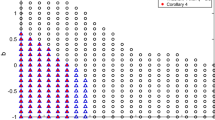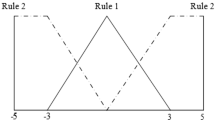Abstract
This paper deals with the robust admissibility and state feedback stabilization problems for discrete-time T-S fuzzy singular systems with norm-bounded uncertainties. By introducing a new approximation technique, the initial membership functions are conveniently expressed in piecewiselinear functions with the consideration of the approximation errors. By utilizing the piecewise-linear membership functions, the fuzzy weighting-based Lyapunov function and the use of auxiliary matrices, the admissibility of the systems is determined by examining the conditions at some sample points. The conditions can be reduced into the normal parallel distributed compensation ones by choosing special values of some slack matrices. Furthermore, the authors design the robust state feedback controller to guarantee the closed-loop system to be admissible. Two examples are provided to illustrate the advantage and effectiveness of the proposed method.
Similar content being viewed by others
References
Takagi T and Sugeno M, Fuzzy identification of systems and its applications to modeling and control, IEEE Transactions on Systems Man and Cybernetics, 1985, 15(1): 116–132.
Ma H, Li H, Liang H, et al., Adaptive fuzzy event-triggered control for stochastic nonlinear systems with full state constraints and actuator faults, IEEE Transactions on Fuzzy Systems, 2019, 27(11): 2242–2254.
Liang H, Zhang L, Sun Y, et al., Containment control of semi-markovian multiagent systems with switching topologies, IEEE Transactions on Systems, Man, and Cybernetics: Systems, 2019, https://doi.org/10.1109/TSMC.2019.2946248.
Zhu W, Wang D, and Zhou Q, Leader-following consensus of multi-agent systems via adaptive event-based control, Journal of Systems Science and Complexity, 2019, 32(3): 846–856.
Xu X, Liu L, and Feng G, Consensus of single integrator multi-agent systems with unbounded transmission delays, Journal of Systems Science and Complexity, 2019, 32(3): 778–788.
Zhang Z, Lin C, and Chen B, New decentralized H∞ filter design for nonlinear interconnected systems based on Takagi-Sugeno fuzzy models, IEEE Transactions on Cybernetics, 2015, 45(12): 2914–2924.
Dong J, Wu Y, and Yang G H, A new sensor fault isolation method for T-S fuzzy systems, IEEE Transactions on Cybernetics, 2017, 47(9): 2437–2447.
Zhang L, Lam H K, Sun Y, et al., Fault detection for fuzzy semi-Markov jump systems based on interval type-2 fuzzy approach, IEEE Transactions on Fuzzy Systems, 2019, https://doi.org/10.1109/TFUZZ.2019.2936333.
Yu J, Shi P, Dong W, et al., Command filtering-based fuzzy control for nonlinear systems with saturation input, IEEE Transactions on Cybernetics, 2017, 47(9): 2472–2479.
Vrkalovic S, Teban T A, and Borlea L D, Stable Takagi-Sugeno fuzzy control designed by optimization, International Journal of Artificial Intelligence, 2017, 15(2): 17–29.
Zhao T and Dian S, Fuzzy static output feedback H∞ control for nonlinear systems subject to parameter uncertainties, Journal of Systems Science and Complexity, 2018, 31(2): 343–371.
Taniguchi T, Tanaka K, and Wang H, Fuzzy descriptor systems and nonlinear model following control, IEEE Transactions on Fuzzy Systems, 2000, 8: 442–452.
Wang H O, Tanaka K, and Griffin M F, An approach to fuzzy control of nonlinear systems: Stability and design issues, IEEE Transactions on Fuzzy Systems, 1996, 4(1): 14–23.
Precup R E, Doboli S, and Preitl S, Stability analysis and development of a class of fuzzy control systems, Engineering Applications of Artificial Intelligence, 2000, 13(3): 237–247.
Hao Y, Structure and stability analysis of general Mamdani fuzzy dynamic models, International Journal of Intelligent Systems, 2005, 20(1): 103–125.
Zeng H B, Teo K L, He Y, et al., Sampled-data-based dissipative control of T-S fuzzy systems, Applied Mathematical Modelling, 2019, 65: 415–427.
Li X, Luo X, Li S, et al., Output consensus for heterogeneous nonlinear multi-agent systems based on T-S fuzzy model, Journal of Systems Science and Complexity, 2017, 30(5): 1042–1060.
Feng G, Stability analysis of discrete-time fuzzy dynamic systems based on piecewise Lyapunov functions, IEEE Transactions on Fuzzy Systems, 2014, 12(1): 22–28.
Lin C, Wang Q G, Lee T H, et al., Fuzzy weighting-dependent approach to H∞ filter design for time-delay fuzzy systems, IEEE Transactions on Signal Processing, 2007, 55: 2746–2751.
Rhee B J and Won S, A new fuzzy Lyapunov function approach for a Takagi-Sugeno fuzzy control system design, Fuzzy Sets and Systems, 2016, 157(9): 1211–1228.
Zhang Z, Lin C, and Chen B, New stability and stabilization conditions for T-S fuzzy systems with time delay, Fuzzy Sets and Systems, 2015, 263: 82–91.
Bernal M, Guerra T M, and Kruszewski A, A membership-function-dependent approach for stability analysis and controller synthesis of Takagi-Sugeno medels, Fuzzy Sets and Systems, 2009, 160(19): 2776–2795.
Lam H K and Narimani M, Stability analysis and performance design for fuzzy-model-based control system under imperfect premise matching, IEEE Transactions on Fuzzy Systems, 2009, 17: 949–961.
Lam H K, Polynomial fuzzy-model-based control systems: Stability analysis via piecewise-linear membership functions, IEEE Transactions on Fuzzy Systems, 2011, 19: 588–593.
Xiao B, Lam H K, and Li H, Stabilization of interval type-2 polynomial-fuzzy-model-based control systems, IEEE Transactions on Fuzzy Systems, 2017, 25: 205–217.
Lam H K and Tsai S H, Stability analysis of polynomial-fuzzy model-based control systems with mismatched premise membership functions, IEEE Transactions on Fuzzy Systems, 2014, 22: 223–229.
Lam H K and Li H, Output-feedback tracking control for polynomial fuzzy-model-based control systems, IEEE Transactions on Industrial Electronics, 2013, 60(12): 5830–5840.
Lee D H, Joo J H, and Tak M H, Local stability analysis of continuous-time Takagi-Sugeno fuzzy systems: A fuzzy Lyapunov function approach, Information Sciences, 2014, 257: 163–175.
Chen J, Xu S, Zhang B, et al., Novel stability conditions for discrete-time T-S fuzzy systems: A Kronecker-product approach, Information Sciences, 2016, 337–338: 72–81.
Chen J, Lin C, Chen B, et al., Regularization and stabilization for rectangular T-S fuzzy discrete-time systems with time delay, IEEE Transactions on Systems, Man, and Cybernetics: Systems, 2019, 49(4): 833–842.
Chen J, Zhang T, Zhang Z, et al., Stability and output feedback control for singular markovian jump delayed systems, Mathematical Control & Related Fields, 2018, 8: 475–490.
Chen J, Lin C, Chen B, et al., Mixed H∞ and passive control for singular systems with time delay via static output feedback, Applied Mathematics & Computation, 2017, 293: 244–253.
Gu P, Tian S, and Liu Q, Closed-loop iterative learning control for discrete singular systems with fixed initial shift, Journal of Systems Science and Complexity, 2019, 32(2): 577–587.
Long S and Zhong S, H∞ control for a class of discrete-time singular systems via dynamic feedback controller, Applied Mathematics Letters, 2016, 58: 110–118.
Ma Y, Jia X, and Liu D, Finite-time dissipative control for singular discrete-time Markovian jump systems with actuator saturation and partly unknown transition rates, Applied Mathematical Modelling, 2018, 53: 49–70.
Hsiung K L and Lee L, Lyapunov inequality and bounded real lemma for discrete-time descriptor systems, IEE Proceedings Control Theory and Applications, 1999, 146: 327–331.
Feng Y and Yagoubi M, On state feedback H∞ control for discrete-time singular systems, IEEE Transactions on Automatic Control, 2013, 58: 2674–2679.
Feng Z and Lam J, Dissipative control and filtering of discrete-time singular systems, International Journal of Systems Science, 2016, 47: 2532–2542.
Xu S, Song B, Lu J, et al., Robust stability of uncertain discrete-time singular fuzzy systems, Fuzzy Sets and Systems, 2007, 158: 2306–2316.
Huang C P, Stability analysis of discrete singular fuzzy systems, Fuzzy Sets and Systems, 2005, 151: 155–165.
Peng T, Han C, Xiong Y, et al., Filter design for discrete-time singularly perturbed T-S fuzzy systems, Journal of the Franklin Institute, 2013, 350: 3011–3028.
Chen J, Lin C, Chen B, et al., Fuzzy-model-based admissibility analysis and output feedback control for nonlinear discrete-time systems with time-varying delay, Information Sciences, 2017, 412–413: 116–131.
Zhang D, Jing Y, Zhang Q, et al., Stabilization of singular T-S fuzzy Markovian jump system with mode-dependent derivative-term coefficient via sliding mode control, Applied Mathematics and Computation, 2020, 364, Article 124643.
Wang J, Ma S, and Zhang C, Finite-time H∞ control for T-S fuzzy descriptor semi-Markov jump systems via static output feedback, Fuzzy Sets and Systems, 2019, 365: 60–80.
Xu S and Lam J, Robust Control and Filtering of Singular Systems, Springer, Berlin, 2006.
Lin C, Wang Q G, Lee T H, et al., LMI Approach to Analysis and Control of Takagi-Sugeno Fuzzy Systems with Time Delay, Springer-Verlag, Berlin Heidelberg, 2007.
Boyd S, Ghaoui L El, Feron E, et al., Linear Matrix Inequalities in System and Control Theory, Philadelphia, PA: SIAM, 1994.
Park G K and Sugeno M, Learning based on linguistic instructions using fuzzy theory, 8th Fuzzy System Symp., 1992, 561–564 (in Japanese).
Chadli M, Karimi H R, and Shi S, On stability and stabilization of singular uncertain Takagi-Sugeno fuzzy systems, Journal of the Franklin Institute, 2014, 351: 1453–1463.
Author information
Authors and Affiliations
Corresponding author
Additional information
This paper was supported in part by the National Natural Science Foundation of China under Grant Nos. 61973179 and 61803220, and in part by the Taishan scholar Special Project Fund under Grant No. TSQN20161026.
This paper was recommended for publication by Editor LI Hongyi.
Rights and permissions
About this article
Cite this article
Chen, J., Yu, J. Robust Control for Discrete-Time T-S Fuzzy Singular Systems. J Syst Sci Complex 34, 1345–1363 (2021). https://doi.org/10.1007/s11424-020-0059-z
Received:
Revised:
Published:
Issue Date:
DOI: https://doi.org/10.1007/s11424-020-0059-z




